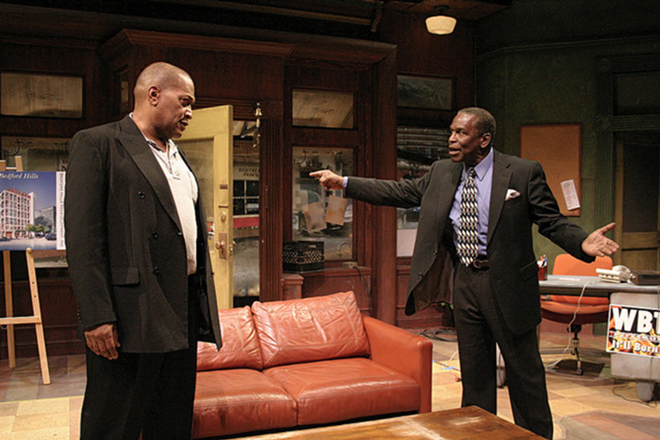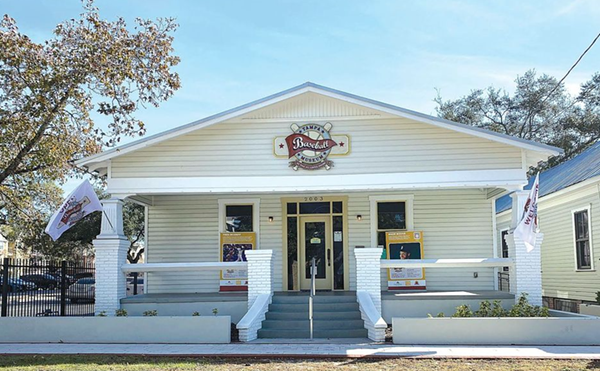Radio Golf runs through Feb. 22 at American Stage; showtimes 8 p.m. Wednesdays-Saturdays, 3 p.m. Saturdays and Sundays
163 Third St. N., St. Petersburg, $39-$49, 727-823-PLAY, americanstage.org.
August Wilson is such a superb writer, even his unnecessary dialogue is rewarding. By “unnecessary” I mean writing that doesn’t advance a play’s action, that restates what we already know and makes us wait for new information and “something to happen.”
There’s more than a little of this in Radio Golf, currently playing in a fine production at American Stage, but Wilson is so eloquent, one can bask in his poetry even while registering its superfluity. And amidst all the repetition there’s also a question in Radio Golf that we don’t find in Wilson’s other plays: just how far successful black people should go in emulating the whites who used to oppress them. The question is asked visually too, in two posters adorning the walls of Harmond Wilks’ redevelopment office, one of Dr. Martin Luther King Jr., the other of Tiger Woods. Which is the image of the contemporary African-American? Is the terrible past to be discarded or treasured? (Yes, this same dilemma animated Wilson’s The Piano Lesson, written 18 years earlier. So repetition exists even in the theme of this later drama.) Anyone familiar with Wilson’s work will foresee his answer: In a society whose racism still smolders beneath the surface, the old indignation mustn’t be jettisoned. Some scars, Wilson tells us, are too vital to conceal.
The dramatic quandary at the center of Radio Golf concerns an old house in Pittsburgh’s Hill District slated for demolition in order that a bright new apartment-complex-with-shops can be built on its site. Two men start the play committed to the destruction of this abandoned property: Harmond Wilks, the Realtor who’s preparing to run for mayor (it’s 1997), and Roosevelt Hicks, his partner, who’s also a go-getting bank vice president. But their plans are complicated with the arrival of a near-derelict named Elder Joseph Barlow, who claims that the property is his and that he intends to bequeath it, after a cosmetic fix-up, to his daughter.
At first, Barlow’s claim seems little more than a nuisance, but Wilks discovers that it has substance, and that he can’t legally — or morally — demand that the house be destroyed. Hicks is adamant that the new complex, with its Starbucks, Whole Foods and Barnes & Noble, must go forward; while Wilks, the more conscientious of the two buddies, tries to find a working compromise. A surprising — and unlikely — coincidence further adds to Wilks’ radicalization, and before the play ends the partners have become adversaries. Giving the opposition more resonance are the contributions of two other characters: Wilks’ wife, Mame, who’s angling for a choice government job (hers if Wilks doesn’t rock the boat), and Sterling Johnson, a construction worker and former schoolmate of Wilks’, who sees his fellow blacks as Native Americans still subject to a predatory white majority.
If the conflict comes to seem schematic — as blatant as those two posters on the realty office’s walls — it nevertheless allows for wonderful oratory and some moments of well-earned laughter. Wilson just doesn’t write bland dialogue; his instincts in this and every other play he ever wrote are alternately lyrical, incantatory, searing or just plain funny.
Wilson gives his actors more than language: He gives them complex personalities capable of changing as we watch. So likable Alan Bomar Jones plays Harmond Wilks as a rising light with big ambitions, but also with backbone and the capacity for self-criticism. The impeccable Kim Sullivan is equally forceful as Hicks, an energetic man impelled by that old American Dream of limitless income, finally available, he believes, even to Americans of color. As Sterling Johnson, ranney offers one of his best performances ever, telling us with his eyes that he’s witnessed some crimes that others dare to call “history”; and Anthony Chisholm as Elder Joseph Barlow could be sane or mad, true or false, all depending on our capacity to interpret. Only Chrystal Bates as Mame Wilks doesn’t manage to persuade. She’s too hard to understand at times, at first garbling her words and then making her one big monologue too melodramatic. Mark Clayton Southers directs with a sureness of velocity and respect for Wilson’s comedy, and Steve Mitchell’s hyper-realistic set, of the redevelopment office in the Hill District, is just tired enough and sharp enough to represent a society at the crossroads. Saidah Ben-Judah’s fine costumes include an unusual outfit for a Wilson play: Hicks’ golfing togs.
At almost three hours, Radio Golf is 45 minutes too long. Even so, it’s a play that features memorable dialogue, thought-provoking commentary, and some notable acting. If you’ve attended the other works in the Century Cycle, you’ll want to add it to your repertoire. Flawed or not, every August Wilson play is too important to miss.
















